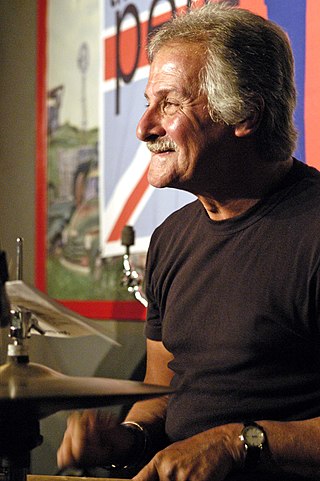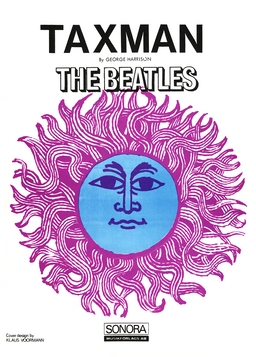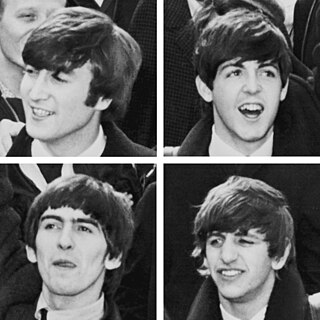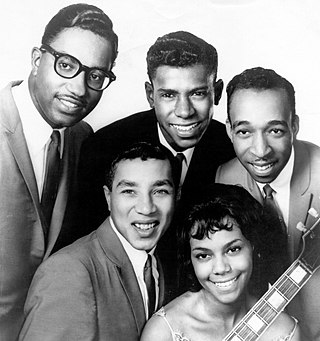
Randolph Peter Best is an English musician who was the drummer for the Beatles from 1960 to 1962. He was dismissed immediately before the band achieved worldwide fame and is one of several people referred to as a fifth Beatle.

The British Invasion was a cultural phenomenon of the mid-1960s, when rock and pop music acts from the United Kingdom and other aspects of British culture became popular in the United States with significant influence on the rising "counterculture" on both sides of the Atlantic Ocean. UK pop and rock groups such as the Beatles, the Rolling Stones, the Bee Gees, the Who, the Kinks, the Zombies, Small Faces, the Dave Clark Five, The Spencer Davis Group, Herman's Hermits, the Hollies, the Animals, Gerry and the Pacemakers, the Searchers, the Yardbirds, Them, and Manfred Mann, as well as solo singers such as Dusty Springfield, Cilla Black, Petula Clark, Tom Jones, and Donovan were at the forefront of the "invasion."
Garage rock is a raw and energetic style of rock and roll that flourished in the mid-1960s, most notably in the United States and Canada, and has experienced a series of subsequent revivals. The style is characterized by basic chord structures played on electric guitars and other instruments, sometimes distorted through a fuzzbox, as well as often unsophisticated and occasionally aggressive lyrics and delivery. Its name derives from the perception that groups were often made up of young amateurs who rehearsed in the family garage, although many were professional.
Power pop is a subgenre of rock music and form of pop rock based on the early music of bands such as the Who, the Beatles, the Beach Boys, and the Byrds. It typically incorporates melodic hooks, vocal harmonies, an energetic performance, and cheerful-sounding music underpinned by a sense of yearning, longing, despair, or self-empowerment. The sound is primarily rooted in pop and rock traditions of the early-to-mid 1960s, although some artists have occasionally drawn from later styles such as punk, new wave, glam rock, pub rock, college rock, and neo-psychedelia.

Andrew McLuckie White was a Scottish drummer, primarily a session musician. He is best known for temporarily replacing Ringo Starr on drums for the Beatles' first single, "Love Me Do". White was featured on the American 7" single release of the song, which also appeared on the band's debut British album, Please Please Me. He also played on "P.S. I Love You", which was the B-side of "Love Me Do".
Beat music, British beat, or Merseybeat is a British popular music genre that developed, particularly in and around Liverpool, in the late 1950s and early 1960s. The genre melded influences from British and American rock and roll, rhythm and blues, skiffle, traditional pop and music hall. It rose to mainstream popularity in the UK and Europe by 1963 before spreading to North America in 1964 with the British Invasion. The beat style had a significant impact on popular music and youth culture, from 1960s movements such as garage rock, folk rock and psychedelic music.

"Taxman" is a song by the English rock band the Beatles from their 1966 album Revolver. Written by the group's lead guitarist, George Harrison, with some lyrical assistance from John Lennon, it protests against the higher level of progressive tax imposed in the United Kingdom by the Labour government of Harold Wilson, which saw the Beatles paying a 95% supertax. The song was selected as the album's opening track and contributed to Harrison's emergence as a songwriter beside the dominant Lennon–McCartney partnership. It was the group's first topical song and the first political statement they had made in their music.
Dave Amels is an American musician and record producer who co-founded music technology companies Voce musical instruments and Bomb Factory. Both companies are known for detailed and realistic mathematical models of complex physical systems. Amels also plays organ in The Reigning Sound, a garage rock band out of Asheville, North Carolina.

"Help!" is a song by the English rock band the Beatles that served as the title song for the 1965 film and the band's accompanying soundtrack album. It was released as a single in July 1965, and was number one for three weeks in the United States and the United Kingdom. Credited to Lennon–McCartney, "Help!" was written by John Lennon with some assistance from Paul McCartney. During an interview with Playboy in 1980, Lennon recounted: "The whole Beatles thing was just beyond comprehension. I was subconsciously crying out for help".
Group sounds, often abbreviated as GS, is a genre of Japanese rock music which became popular in the mid to late 1960s and initiated the fusion of Japanese kayōkyoku music and Western rock music. Their music production techniques were regarded as playing a pioneering role in modern Japanese popular music.

Liverpool has a lengthy tradition of music both classical and pop. It is well known for the Beatles. Its pop and rock music scene has also been important in the development of a number of other bands and artists since the 1950s.
Nederbeat is a genre of rock music that began with the Dutch rock boom in the mid-1960s influenced by British beat groups and rock bands such as the Beatles and the Rolling Stones. Much like British freakbeat, it is essentially the Dutch counterpart to American garage rock. Among the best-known Nederbeat groups are the Golden Earring, The Motions, The Outsiders and Shocking Blue.

The A-Bones was an American garage rock band from Brooklyn, New York. Their name was derived from a song by The Trashmen. The band was formed in 1984 by vocalist Billy Miller and his wife, drummer and co-vocalist Miriam Linna, in the wake of a prior band collaboration, The Zantees. The couple were at the time editors of the rock and roll culture fanzine Kicks and on the threshold of launching Norton Records. Guitarist Bruce Bennett replaced original guitarist Mike Mariconda shortly after the band was formed. Marcus "The Carcass" Natale replaced founding bass player Mike Lewis, prior to recording the A-Bones second E.P. Free Beer For Life in 1988. Tenor sax player Lars Espensen further filled out the group from 1990 until 2010.

This article includes an overview of the events and trends in popular music in the 1960s.
Music of the United Kingdom developed in the 1960s into one of the leading forms of popular music in the modern world. By the early 1960s the British had developed a viable national music industry and began to produce adapted forms of American music in Beat music and British blues which would be re-exported to America by bands such as the Beatles, the Animals and the Rolling Stones. This helped to make the dominant forms of popular music something of a shared Anglo-American creation, and led to the growing distinction between pop and rock music, which began to develop into diverse and creative subgenres that would characterise the form throughout the rest of the twentieth century.

The Bawdies is a Japanese rock band signed to the Seez Records label and the Getting Better sub-label of Victor Entertainment. The band is heavily influenced by 1950s-1960s beat music and early rhythm & blues styles of music.

The Gentlemen were an American garage rock band from Dallas, Texas, who were active from 1964 to 1968. They are best known for their 1966 song, "It's a Cry'n Shame", which has been recognized as one of the greatest songs in garage rock. The band is noted for the contributions of guitarist and songwriter, Seab Meador. Jimmie Vaughan, later a member the Fabulous Thunderbirds and brother of Double Trouble guitarist Stevie Ray Vaughan, served a brief stint for several months in the Gentlemen in late 1965 and early 1966, but did not appear on any of their recordings. He went on to play in another Dallas garage rock band, the Chessmen.

GS I Love You Too: Japanese Garage Bands of the 1960s is the second installment in the GS I Love You CD compilation series, featuring songs from the Group sounds movement in Japan during the 1960s. GS was essentially the Japanese variant of garage and psychedelic rock. Japan, like many Western countries, experienced a beat boom in the 1960s as a result of the British Invasion, particularly in the wake of the Beatles' 1966 visit to the country. Though the Japanese beat craze blossomed slightly later than in the West, it stretched well into the end of the decade, with groups continuing to play in the beat/garage style after it had fallen out of favor elsewhere. Surf rock, which had been popular in Japan since before the arrival of the Beatles continued to exert influence on the music throughout the decade. Bands typically sang in both Japanese and English. GS I Love You Too was issued in 1999 by Big Beat Records. Like the first entry in the series, it is noted for good mastering and high sound quality. The front cover sleeve of the CD is adorned with a backdrop of bright red sun rays invoking the pre-WWII (pre-surrender) Japanese imperial flag, and the inside includes English liner notes that provide biographical information about the groups and their songs.











